
Apiculturists specialize in the care and management of honeybee colonies to enhance pollination and honey production. They monitor hive health, control pests such as Varroa mites, and analyze bee behavior for sustainable practices. Expertise in botany and environmental science supports apiculturists in optimizing hive productivity and ecosystem balance.
Individuals who enjoy working outdoors and are comfortable handling insects may find Apiculture a suitable profession. Those with patience, attention to detail, and an interest in environmental sustainability are more likely to succeed in this field. People prone to allergies, fear of stings, or aversion to insects might find this job less compatible with their conditions.
Qualification
Apiculturists typically require a strong background in biology, entomology, or agriculture, often holding a bachelor's degree in one of these fields. Practical experience with bee management, hive monitoring, and pest control is essential for effective conservation and honey production. Certifications in beekeeping and knowledge of local regulations further enhance qualifications and career prospects.
Responsibility
Apiculturists manage and maintain bee colonies to ensure the health and productivity of hives, focusing on honey production, pollination services, and the prevention of diseases and pests. They monitor hive conditions, perform regular inspections, and apply treatments to control mites, fungi, and bacterial infections that can harm bee populations. Responsibilities also include breeding queen bees, harvesting honey and beeswax, and maintaining detailed records of hive performance and environmental factors.
Benefit
Apiculturists likely gain substantial benefits from their work, including improved environmental awareness and direct contribution to ecosystem health through pollination. There is a high probability of developing specialized skills in bee management and honey production, which can lead to niche market opportunities. Health benefits may also be probable due to increased outdoor activity and exposure to nature.
Challenge
Apiculturist jobs likely involve challenges such as managing the health of bee colonies in the face of diseases, pests, and environmental changes. It is probable that they must adapt techniques to ensure sustainable honey production while protecting pollinator populations. Difficulties may arise in balancing commercial objectives with ecological responsibilities and regulatory compliance.
Career Advancement
Apiculturists can advance their careers by gaining specialized knowledge in bee biology, disease management, and sustainable hive practices, leading to roles in research, agricultural consulting, or commercial honey production. Certification programs and experience with advanced equipment increase employability and opportunities for leadership positions in apiary management. Networking within agricultural organizations and contributing to pollination projects also open pathways to higher-level positions and industry recognition.
Key Terms
Apiary Management
Apiculturists specializing in apiary management oversee the health and productivity of bee colonies, ensuring optimal conditions for honey production and pollination services. They monitor hive vitality, control pests and diseases, and implement sustainable practices to enhance bee welfare. Effective apiary management requires expertise in bee behavior, environmental factors, and seasonal maintenance tasks to maximize colony performance.
Colony Health
Apiculturists specialize in maintaining optimal colony health by monitoring disease levels, controlling pests like Varroa mites, and ensuring adequate nutrition through hive management techniques. They implement integrated pest management strategies and conduct regular inspections to prevent colony collapse disorder and promote honeybee resilience. Effective colony health management directly impacts pollination efficiency and honey production quality.
Queen Rearing
Queen rearing is a specialized skill in apiculture involving the selective breeding and nurturing of queen bees to enhance colony health and productivity. Apiculturists engaged in queen rearing employ techniques such as grafting larvae, controlled mating, and hive management to ensure genetic diversity and disease resistance. Mastery of queen rearing contributes significantly to sustainable beekeeping practices and increased honey yield.
Pollination Services
Apiculturists specializing in pollination services manage honeybee colonies to enhance crop pollination efficiency, directly boosting agricultural yields. Their expertise includes monitoring hive health, optimizing bee foraging patterns, and coordinating hive placements in orchards and fields. Effective pollination by managed bees supports biodiversity and increases production of fruits, nuts, and vegetables globally.
Hive Maintenance
Apiculturists specializing in hive maintenance monitor colony health by inspecting hives for pests, diseases, and structural damage to ensure optimal bee productivity. They manage hive conditions by adjusting frames, replacing old comb, and controlling ventilation to support honey production and pollination activities. Regular hive maintenance reduces colony stress, prevents swarming, and maximizes overall apiary efficiency.
 kuljobs.com
kuljobs.com